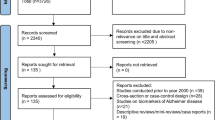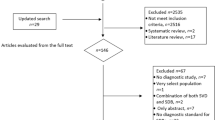Abstract
Sleep-disordered breathing (SDB) is related to the incidence of cognitive decline. However, results of cohort studies were inconsistent. We performed a meta-analysis of cohort studies to evaluate the sequential association between SDB and cognitive decline. Cohort studies were identified by the searching of PubMed and Embase databases. A random effect model was applied to combine the results. Nineteen thousand nine hundred forty participants from six cohort studies were included. Participants with SDB at baseline had significantly higher risk of cognitive decline, as indicated by a combined outcome of mild cognitive impairment (MCI) or dementia (RR = 1.69, p < 0.001; I 2 = 60%). The association between SDB and the subsequent risk of cognitive decline remains in older people (RR = 1.70, p < 0.001; I 2 = 66%). Results of subgroup analyses indicated consistent results regardless of whether SDB was confirmed by PSG or whether the apolipoprotein E4 allele was adjusted. However, participants with SDB at baseline were with higher risk for developing MCI (RR = 2.44, p < 0.001) than dementia (RR = 1.61, p < 0.001; p for subgroup difference = 0.04). Moreover, SDB was associated with a significantly higher risk of cognitive decline in female participants (RR = 2.06, p < 0.001), but not in the males (RR = 1.18, p = 0.19; p for subgroup difference = 0.03). SDB may be an independent risk factor for the developing of cognitive decline, and gender difference may exist regarding this association.



Similar content being viewed by others
References
Farrell PC, Richards G (2017) Recognition and treatment of sleep-disordered breathing: an important component of chronic disease management. J Transl Med 15(1):114. https://doi.org/10.1186/s12967-017-1211-y
McMillan A, Morrell MJ (2016) Sleep disordered breathing at the extremes of age: the elderly. Breathe (Sheff) 12(1):50–60. https://doi.org/10.1183/20734735.003216
Querejeta Roca G, Shah AM (2015) Sleep disordered breathing: hypertension and cardiac structure and function. Curr Hypertens Rep 17(12):91. https://doi.org/10.1007/s11906-015-0604-7
Linz D, Woehrle H, Bitter T, Fox H, Cowie MR, Bohm M, Oldenburg O (2015) The importance of sleep-disordered breathing in cardiovascular disease. Clin Res Cardiol 104(9):705–718. https://doi.org/10.1007/s00392-015-0859-7
Birkbak J, Clark AJ, Rod NH (2014) The effect of sleep disordered breathing on the outcome of stroke and transient ischemic attack: a systematic review. J Clin Sleep Med 10(1):103–108. https://doi.org/10.5664/jcsm.3376
Hudgel DW (2016) Critical review: CPAP and weight management of obstructive sleep apnea cardiovascular co-morbidities. Sleep Med Rev. https://doi.org/10.1016/j.smrv.2016.12.001
Gauthier S, Reisberg B, Zaudig M, Petersen RC, Ritchie K, Broich K, Belleville S, Brodaty H, Bennett D, Chertkow H, Cummings JL, de Leon M, Feldman H, Ganguli M, Hampel H, Scheltens P, Tierney MC, Whitehouse P, Winblad B (2006) Mild cognitive impairment. Lancet 367(9518):1262–1270. https://doi.org/10.1016/S0140-6736(06)68542-5
Hugo J, Ganguli M (2014) Dementia and cognitive impairment: epidemiology, diagnosis, and treatment. Clin Geriatr Med 30(3):421–442. https://doi.org/10.1016/j.cger.2014.04.001
Apostolo J, Holland C, O'Connell MD, Feeney J, Tabares-Seisdedos R, Tadros G, Campos E, Santos N, Robertson DA, Marcucci M, Varela-Nieto I, Crespo-Facorro B, Vieta E, Navarro-Pardo E, Selva-Vera G, Balanza-Martinez V, Cano A (2016) Mild cognitive decline. A position statement of the Cognitive Decline Group of the European Innovation Partnership for Active and Healthy Ageing (EIPAHA). Maturitas 83:83–93. https://doi.org/10.1016/j.maturitas.2015.10.008
Row BW (2007) Intermittent hypoxia and cognitive function: implications from chronic animal models. Adv Exp Med Biol 618:51–67
Etgen T, Sander D, Bickel H, Forstl H (2011) Mild cognitive impairment and dementia: the importance of modifiable risk factors. Dtsch Arztebl Int 108(44):743–750. https://doi.org/10.3238/arztebl.2011.0743
Porter VR, Buxton WG, Avidan AY (2015) Sleep, cognition and dementia. Curr Psychiatry Rep 17(12):97. https://doi.org/10.1007/s11920-015-0631-8
Shastri A, Bangar S, Holmes J (2016) Obstructive sleep apnoea and dementia: is there a link? Int J Geriatr Psychiatry 31(4):400–405. https://doi.org/10.1002/gps.4345
Yaffe K, Laffan AM, Harrison SL, Redline S, Spira AP, Ensrud KE, Ancoli-Israel S, Stone KL (2011) Sleep-disordered breathing, hypoxia, and risk of mild cognitive impairment and dementia in older women. JAMA 306(6):613–619
Chang WP, Liu ME, Chang WC, Yang AC, Ku YC, Pai JT, Huang HL, Tsai SJ (2013) Sleep apnea and the risk of dementia: a population-based 5-year follow-up study in Taiwan. PLoS One 8(10):e78655. https://doi.org/10.1371/journal.pone.0078655
Ju YE (2013) Obstructive sleep apnea increases risk of incident dementia in community-dwelling older adults. Neurology 80 (1). http://www.neurology.org/content/80/7_Supplement/P03.098 (Accessed on 14 Aug 2017)
Blackwell T, Yaffe K, Laffan A, Redline S, Ancoli-Israel S, Ensrud KE, Song Y, Stone KL (2015) Associations between sleep-disordered breathing, nocturnal hypoxemia, and subsequent cognitive decline in older community-dwelling men: the Osteoporotic Fractures in Men Sleep Study. J Am Geriatr Soc 63(3):453–461
Osorio RS, Gumb T, Pirraglia E, Varga AW, Lu SE, Lim J, Wohlleber ME, Ducca EL, Koushyk V, Glodzik L, Mosconi L, Ayappa I, Rapoport DM, de Leon MJ (2015) Sleep-disordered breathing advances cognitive decline in the elderly. Neurology 84(19):1964–1971
Ding X, Kryscio RJ, Turner J, Jicha GA, Cooper G, Caban-Holt A, Schmitt FA, Abner EL (2016) Self-reported sleep apnea and dementia risk: findings from the prevention of Alzheimer’s disease with vitamin E and selenium trial. J Am Geriatr Soc 64(12):2472–2478. https://doi.org/10.1111/jgs.14393
Stroup DF, Berlin JA, Morton SC, Olkin I, Williamson GD, Rennie D, Moher D, Becker BJ, Sipe TA, Thacker SB (2000) Meta-analysis of observational studies in epidemiology: a proposal for reporting. Meta-analysis Of Observational Studies in Epidemiology (MOOSE) group. JAMA 283(15):2008–2012
Higgins J, Green S (2011) Cochrane handbook for systematic reviews of interventions version 5.1.0. The Cochrane collaboration. www.cochranehandbook.org
Wells GA, Shea B, O’Connell D, Peterson J, Welch V, Losos M, Tugwell P (2010) The Newcastle-Ottawa Scale (NOS) for assessing the quality of nonrandomised studies in meta-analyses. http://www.ohri.ca/programs/clinical_epidemiology/oxford.asp
Higgins JP, Thompson SG (2002) Quantifying heterogeneity in a meta-analysis. Stat Med 21(11):1539–1558. https://doi.org/10.1002/sim.1186
Patsopoulos NA, Evangelou E, Ioannidis JP (2008) Sensitivity of between-study heterogeneity in meta-analysis: proposed metrics and empirical evaluation. Int J Epidemiol 37(5):1148–1157. https://doi.org/10.1093/ije/dyn065
Egger M, Davey Smith G, Schneider M, Minder C (1997) Bias in meta-analysis detected by a simple, graphical test. BMJ 315(7109):629–634
Ancoli-Israel S, Palmer BW, Cooke JR, Corey-Bloom J, Fiorentino L, Natarajan L, Liu L, Ayalon L, He F, Loredo JS (2008) Cognitive effects of treating obstructive sleep apnea in Alzheimer’s disease: a randomized controlled study. J Am Geriatr Soc 56(11):2076–2081
Cooke JR, Ayalon L, Palmer BW, Loredo JS, Corey-Bloom J, Natarajan L, Liu L, Ancoli-Israel S (2009) Sustained use of CPAP slows deterioration of cognition, sleep, and mood in patients with Alzheimer’s disease and obstructive sleep apnea: a preliminary study. J Clin Sleep Med 5(4):305–309
Yuan HC (2012) Neurocognitive functioning in children with obstructive sleep apnea syndrome: a pilot study of positive airway pressure therapy. J Pediatr Nurs 27(6):607
Crawford-Achour E (2015) Protective effect of long-term CPAP therapy on cognitive performance in elderly patients with severe OSA: the PROOF study. J Clin Sleep Med 11(5):519
Kanbay A, Demir NC, Tutar N, Köstek O, Özer Şimşek Z, Buyukoglan H, Demir R, Parrino L (2015) The effect of CPAP therapy on insulin-like growth factor and cognitive functions in obstructive sleep apnea patients. Clin Respir J 1(4):506–513. https://doi.org/10.1111/crj.12365
Gozal D, Daniel JM, Dohanich GP (2001) Behavioral and anatomical correlates of chronic episodic hypoxia during sleep in the rat. J Neurosci 21(7):2442–2450
Zeng YM, Cai KJ, Chen XY, Wu MX, Lin X (2009) Effect of chronic intermittent hypoxia on the expression of Nip3, cell apoptosis, beta-amyloid protein deposit in mice brain cortex. Chin Med J 122(1):68–73
O’Hara R, Luzon A, Hubbard J, Zeitzer JM (2009) Sleep apnea, apolipoprotein epsilon 4 allele, and TBI: mechanism for cognitive dysfunction and development of dementia. J Rehabil Res Dev 46(6):837–850
Mehra R, Benjamin EJ, Shahar E, Gottlieb DJ, Nawabit R, Kirchner HL, Sahadevan J, Redline S (2006) Association of nocturnal arrhythmias with sleep-disordered breathing: the Sleep Heart Health Study. Am J Respir Crit Care Med 173(8):910–916. https://doi.org/10.1164/rccm.200509-1442OC
Pandya SY, Clem MA, Silva LM, Woon FL (2016) Does mild cognitive impairment always lead to dementia? A review. J Neurol Sci 369:57–62. https://doi.org/10.1016/j.jns.2016.07.055
Valipour A (2012) Gender-related differences in the obstructive sleep apnea syndrome. Pneumologie 66(10):584–588. https://doi.org/10.1055/s-0032-1325664
Leppanen T, Kulkas A, Duce B, Mervaala E, Toyras J (2017) Severity of individual obstruction events is gender dependent in sleep apnea. Sleep Breath 21(2):397–404. https://doi.org/10.1007/s11325-016-1430-0
Baker M, Scott B, Johnson RF, Mitchell RB (2017) Predictors of obstructive sleep apnea severity in adolescents. JAMA Otolaryngol Head Neck Surg 143(5):494–499. https://doi.org/10.1001/jamaoto.2016.4130
Mirza MA, Ritzel R, Xu Y, McCullough LD, Liu F (2015) Sexually dimorphic outcomes and inflammatory responses in hypoxic-ischemic encephalopathy. J Neuroinflammation 12:32. https://doi.org/10.1186/s12974-015-0251-6
Smith AL, Alexander M, Rosenkrantz TS, Sadek ML, Fitch RH (2014) Sex differences in behavioral outcome following neonatal hypoxia ischemia: insights from a clinical meta-analysis and a rodent model of induced hypoxic ischemic brain injury. Exp Neurol 254:54–67. https://doi.org/10.1016/j.expneurol.2014.01.003
Weaver EM, Kapur V, Yueh B (2004) Polysomnography vs self-reported measures in patients with sleep apnea. Arch Otolaryngol Head Neck Surg 130(4):453–458. https://doi.org/10.1001/archotol.130.4.453
Funding
No funding was received for this research.
Author information
Authors and Affiliations
Corresponding author
Ethics declarations
Conflict of interest
The authors declare that they have no conflict of interest.
Ethical approval
This article does not contain any studies with human participants performed by any of the authors.
Electronic supplementary material
Supplemental Figure 1
(DOCX 245 kb)
Rights and permissions
About this article
Cite this article
Zhu, X., Zhao, Y. Sleep-disordered breathing and the risk of cognitive decline: a meta-analysis of 19,940 participants. Sleep Breath 22, 165–173 (2018). https://doi.org/10.1007/s11325-017-1562-x
Received:
Revised:
Accepted:
Published:
Issue Date:
DOI: https://doi.org/10.1007/s11325-017-1562-x




